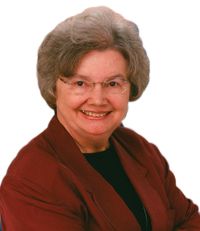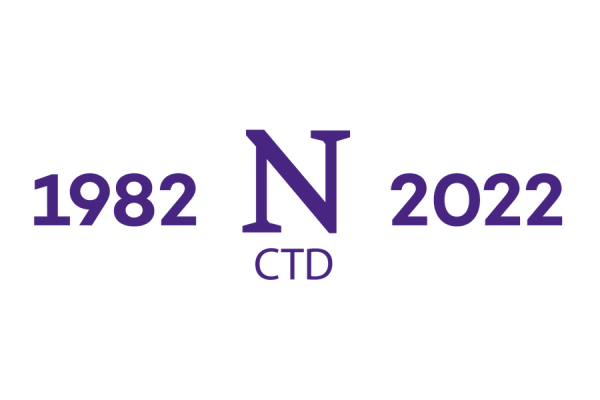Summer 2022
Talent Newsletter
Talent Newsletter
In this issue of Talent: Director's Message: Celebrating 40 Years of CTD and Talent Development | From Potential to Expertise: CTD’s Talent Development Story | Students Speak Up | What CTD Means
 Center for Talent Development is celebrating its 40th anniversary! In this issue of Talent, we explore CTD’s talent development pathway. Four decades of innovative, talent development programming and exceptional research have had a profound effect on hundreds of thousands of families and educators and the fields of gifted education and talent development.
Center for Talent Development is celebrating its 40th anniversary! In this issue of Talent, we explore CTD’s talent development pathway. Four decades of innovative, talent development programming and exceptional research have had a profound effect on hundreds of thousands of families and educators and the fields of gifted education and talent development.
More importantly, though, we look to the future and share the inspiring talent development stories of CTD students, alums, and staff. CTD has been and will always be a home for curious, intrepid young people looking to explore their interests and develop their talents fully. Whether you are new to CTD or have been with us for many years, I welcome you to our community of learners and want you feel at home.
This issue celebrates our community, so read about our journey, get inspired by our new video, and if you have a favorite CTD memory or a talent development pathway story to share, submit it via our 40th Anniversary website.
It has been an honor and a pleasure to lead CTD for the last 34 years. I look forward to hearing from you and adding new chapters to CTD’s talent development story.
![]()
Paula Olszewski-Kubilius
When Center for Talent Development (CTD) was founded by Dr. Joyce VanTassel-Baska 40 years ago, its primary functions were recognizing talent and providing excellent talent development programs for students, their families, and educators. These activities remain a hallmark of CTD’s work, but the center’s mission has expanded.
Under the direction of CTD’s long-time director, Dr. Paula Olszewski-Kubilius the mission now includes research, innovation, and leadership in the fields of gifted education and talent development. CTD has become an internationally recognized organization promoting talent development both inside and outside of schools from early childhood through early adulthood. CTD is also at the forefront of research, as Olszewski-Kubilius’s work on talent development has had a significant impact on how educators around the world understand and implement gifted education services.
CTD was first established as a talent search program for students in Illinois to address an unmet need VanTassel-Baska witnessed first-hand as the state director for gifted education. There were very few talent identification and talent development programs in the state, particularly for students from low-income households and students of color who could benefit from academic acceleration. VanTassel-Baska considered how she could develop something useful to students and families, and at what scale it could be done.
She was inspired by the work and mentorship of Dr. Julian Stanley at Johns Hopkins University, who developed what became known as the talent search model in the early 1970s. The talent search model has four tenets, which together foster talent development:

Van Tassel-Baska’s Midwest Academic Talent Search project began in 1982, serving an eight-state region. In its first year, the program served approximately 12,000 students, initiating what would become a nationwide enterprise. “I saw firsthand how talent search made a difference in students’ lives,” says VanTassel-Baska. “I also saw its potential to change gifted education within local school districts — to encourage districts to look more systematically at identification and the opportunities, particularly accelerative opportunities, provided for these students.” Following an assessment, students were offered the opportunity to take a variety of accelerated courses via mail correspondence through LetterLinks, a precursor to CTD’s online programs.
By the second year of the Midwest Academic Talent Search, sixty-five universities throughout the Midwest were interested in offering enrichment and accelerative learning opportunities for gifted learners. With a new tool to identify strengths beyond those demonstrated on state-level standardized tests — and a mechanism to put in place a robust talent search and measuring growth year to year — VanTassel-Baska and her colleagues witnessed just how capable these advanced young students were.
In 1983 the Midwest Academic Talent Search project’s first summer residential program took place on Northwestern University’s campus, establishing what would become CTD’s flagship summer programming. Northwestern was a perfect home for the growing organization because David Wiley, then dean of Northwestern University’s School of Education, had been a graduate student of Julian Stanley and was supportive of the work being done. In 1986, the Midwest Academic Talent Search project was officially renamed the Center for Talent Development (CTD).
The name of the center was chosen deliberately and strategically to reflect the more inclusive, developmental view of giftedness. Though Julian Stanley’s work had gained significant traction across the country, talent development was still a novel framework for gifted education at the time. But with David Wiley as dean and Northwestern faculty member Benjamin Bloom publishing his book Developing Talent In Young People, the synergy and timing made sense. Talent development broadened the traditional gifted model, expanding access to students that had not been previously identified. It took a more contextual, lifelong approach to gifted education. A focus on social justice — and recognizing the importance of contexts and opportunities impacting student potential — has continued at CTD in the form of programming dedicated to serving marginalized populations of students, research, grants, and scholarships.
In 1986 when Olszewski-Kubilius became director of CTD, she worked diligently to expand the age of students served and the scope of programs available. Beginning in the 1990’s, and continuing today, thousands of students are served each year through an array of summer, weekend, and distance learning programs. Beyond student programs, CTD has built a reputation as a resource for parents, and for high-quality professional learning for educators and gifted education coordinators. It has also gained national recognition for research — studying psychological, sociological, and educational issues related to giftedness and talent development.
CTD’s commitment to the tenets of talent search has remained constant, though how the tenets are applied has taken a unique twist based on research. This unique twist is what CTD now calls its Pathways approach to talent development. A pathway starts with exploration of interests and identification of strengths and progresses to more focused and intensive services as students get older and develop a clearer picture of their abilities and goals. And all pathways to talent development consist of two components: challenge and support. Challenge begins with an assessment of students’ strengths, interests, and learning needs to match students with the advanced enrichment and accelerated programs that they need to learn and grow. Support comes from a community of peers, skilled teachers, and mentors who help students develop the knowledge and skills they need to become bold, creative achievers and contributors.
Every CTD program and service is grounded in this approach. “We know now that in young children ability is more general. As children grow and develop, they begin to identify specific areas where they are more talented — math, spatial reasoning, verbal, or some other area,” says Olszewski-Kubilius. “Our task is to help young people discover the areas in which they have strengths and guide them toward fields that capitalize on them.” Olszewski-Kubilius believes that if children don’t have opportunities or context in which to experience a particular domain or to express their abilities, they might go unnoticed. That’s where CTD’s work has become vital.
Today, CTD engages in collaboration with families, schools, and organizations around the world. Students from every state in the U.S — and dozens of countries around the world — participate in CTD programs each year. The vision is to be a partner in creating education systems that provide opportunities for every young person to nurture their talents fully. Olszewski-Kubilius expects to see the talent development approach continue to gain traction around the world, inspired in many ways by work done at CTD.
Olszewski-Kubilius wants CTD to be seen as “a community that provides the challenge and support students need to become bold, creative achievers” and a place where students feel at home and supported on their talent development journey.
Did you know?
- The name Center for Talent Development wasn’t adopted until 1986–four years after the founding of the organization.
- CTD’s name was inspired by conversations with Northwestern professor Benjamin Bloom and dean David Wiley after the publication of Bloom’s book, Developing Talent In Young People.
- CTD’s first academic program was LearningLinks, a set of correspondence by mail courses for students who needed acceleration as identified by above-grade-level testing.
When we asked students to use three words—and only three words—to describe CTD, the most frequent word was “fun”. This simple, three-letter word may not seem like a deep revelation, but given the context of rigorous, academic acceleration and enrichment programs, this is likely very surprising to many.
 But working hard in your area of interest, honing your strengths, achieving in the face of challenges, and being surrounded by peers and experts who support you IS fun, and that is the message from CTD students. CTD students value nurturing their talents with a community of peers and supportive adults. This is the foundation of CTD. An organization that started with a simple, yet novel, idea has inspired hundreds of thousands of students, led to advancements in the field of talent development, and shifted how people view exceptional ability and the development of talent. That’s fun AND cool.
But working hard in your area of interest, honing your strengths, achieving in the face of challenges, and being surrounded by peers and experts who support you IS fun, and that is the message from CTD students. CTD students value nurturing their talents with a community of peers and supportive adults. This is the foundation of CTD. An organization that started with a simple, yet novel, idea has inspired hundreds of thousands of students, led to advancements in the field of talent development, and shifted how people view exceptional ability and the development of talent. That’s fun AND cool.

Whether you are an old friend or just learning about CTD, we invite you to explore the stories and milestones highlighted on our 40th Anniversary web page or share your own talent development journey. View our new video, find people you know, courses you attended, or get motivated to learn more! If you would like to submit your own profile for consideration, you can submit our online form.